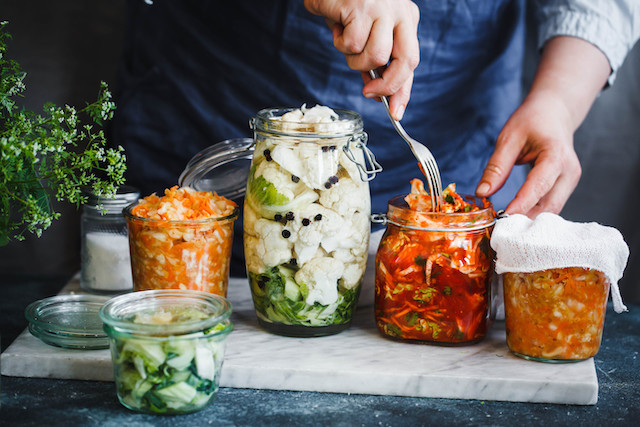If you are kicking yourself for not stocking up on flour before the lockdown started, you are probably not alone—“bread” was the sixth most-searched for term on Google in Luxembourg over the past 30 days. That partly explains the flour shortages in many stores.
“Luckily I ordered 10 kilos of flour before all of this happened,” Keven Erickson, a Luxembourg photographer and sour dough enthusiast tells me. He was expecting to give a workshop about making sour dough but it was among the things that got cancelled when the coronavirus began to spread. Erickson began making sour dough six years ago.
The starter culture he developed back then, playfully dubbed “Penelope” and pictured below, is still going strong.

Penelope, the six-year-old sour dough culture. Photo: Keven Erickson
“It takes a few weeks to get a good strong culture going. You mix water and flour and it starts to ferment,” he says. Unlike most baking which you might forget about once you’ve eaten the result, sour dough is an ongoing process.
Like a pet, the culture requires constant “feeding”, sometimes more than once a day. Erickson likens it to the digital Tamagotchi pets that were a popular toy in the 1990s, but more natural, healthier and, well, alive. The photographer became interested in sour dough as part of a wider approach to unprocessed, organic and, sometimes, homegrown food. He uses heirloom grains he mills himself and which also means a lower gluten content.
Often spending over a day on a single loaf, he doesn’t imagine himself making a business out of it. But that's not why he does it--Erickson says keeping Penelope alive can feel like a kind of meditation and he particularly enjoys giving bread to friends as a gift. And now it seems a wider public is rediscovering the joy of baking. “On my social media feed, I’ve seen lots of people baking, and making tarts. There has definitely been more now. It’s a shame I didn’t do the workshop before the confinement,” he says.
Recipes for success
The comfort found in a well-stocked kitchen and the joy of cooking and baking are something that Kathy Liebl is hoping to encourage and share with customers while her café, Kathy’s Deli and Cupcakery, is closed for confinement.
Since the lockdown, she has been posting simple clear recipes with mouthwatering photos on her business's Facebook page. “It was just something I felt might help people who currently cannot get out to their local favourite restaurant or bakery,” Liebl says. Feedback has been positive with some readers posting their own baking achievements. “Whilst we need all the restaurants that are still open for deliveries to do well with their take-out menus, I love the fact that people are getting reacquainted with their kitchens and are trying new things.”

Archive photo shows Kathy Liebl at Kathy's Cupcakery in pre-covid-19 times. Photo: Maison Moderne
While some shops suffer flour shortages, the entrepreneur says she is fortunate that her local Delhaize in Junglinster has a “good supply of plain and self-raising flour”. Finding breadmaking flours is less easy, she says. But people can also bookmark their favourite recipes and make them when ingredients become available again. In the meantime, she also posts other, non-baking recipes like juices, soups and curries.
Fermentation for the nation
While Liebl’s business activities have been stifled by the confinement, husband and wife part-time entrepreneurs Björn Lorenzen and Stefania Filice say confinement is an ideal opportunity for people to experiment with fermenting. The couple had the idea for their startup, Micro Jungle, a few years ago after they had their first child together and Stefania rediscovered the food fermentation techniques she learned from her grandmother in Italy.
“Traditional learning to ferment is trial and error. It takes a lot of frustration at the beginning and often food isn’t what you expect,” says Lorenzen, a German-Luxembourg national who works as a teacher. The pair began looking into the science and eventually developed their own kits and activators as well as recipes and tutorials to help make it as accessible as possible. So-called good bacteria from fermentation are already found in products developed for the commercial food industry, although often they contain a single bacterium. “This isn’t our concept. We see fermentation as different types of bacteria which work together […] You can have a stable community of bacteria which settle the gut which is where the immune system is situated.”

Lawyer Stefania Felice and teacher Björn Lorenzen are pictured with their fermentation jars. Photo: Micro Jungle
It also makes life a lot easier for a busy cook when fermented vegetables are cut and ready to toss into the pan or on a salad. And there is the chance to experiment with different flavours. “We’re always experimenting, trying out and developing new things,” the teacher says, adding his favourites are the fish creations. “You can ferment everything. You can even ferment food you’ve already cooked,” he says.
Today the couple has around 50 fermentation jars filled with different ingredients on the go in their store cupboards. In non-covid-19 times, they give training but while that is on hold, they are selling their kits online through Letzshop and via Naturata. You can find recipes and more information on their Microtarians education page.
